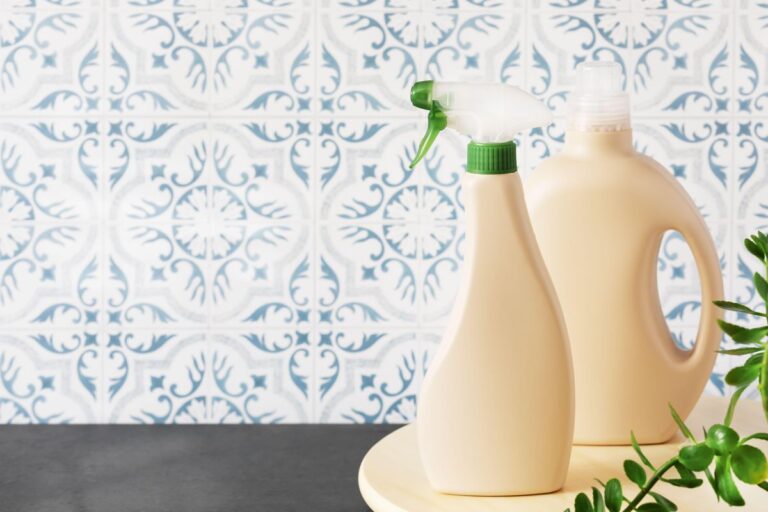It's easy for dirt to accumulate in a busy kitchen, so regularly cleaning your kitchen tiles creates a more inviting environment for cooking, socializing and entertaining.
Cleaning your kitchen tiles will not only enhance the appearance of your cooking area, but it will also help you develop good kitchen cleaning and maintenance habits that will help extend the life of your tiles.
“Proper cleaning and maintenance will help maximise the lifespan of your tiles,” says David Talbot, specifier at Craven Danil.
“Wall and floor tiles come in many different shapes and sizes, but no matter what type of tile is used, it will require a cleaning method that is appropriate for that type of tile. We recommend testing cleaning products and methods in an inconspicuous area first. We recommend never using abrasive cleaners, scrubbing pads, metal scrubbers or steam cleaners on ceramic tile.”
Cleaning kitchen tiles
While different types of kitchen tile may require special cleaning methods, there's a basic cleaning guide you can follow, says Jerina Saliu, chief innovation officer at Kris Jenner's home care and cleaning brand, Safely You won't be surprised to learn that it features baking soda for cleaning.
You will need:
- All-purpose cleaner
- baking soda
- Cleaning brush
- Mop (for floor tiles)
- Reusable paper towels or a damp cloth
1. Spray the cleaner and add baking soda
Spray the backsplash and floor tiles liberally with all-purpose cleaner.
Sprinkle some baking soda on top of the cleaner.
2. Mix together
Use a non-abrasive brush to blend the mixture.
Leave the mixture for about 30 minutes.
3. Remove the mixture
Remove the mixture with water and a reusable paper towel, or use a mop if you have floor tiles.
Cleaning kitchen floor tiles
The kitchen is one of the busiest spaces in the home, with kids' footsteps, wet dog paws, daily family meals and lavish dinner parties, so keeping your tiles clean is essential.
Firstly, what to avoid? “For floor tile, avoid cleaners and degreasers that contain wax, sodium silicate or other additives that leave sticky deposits, as these create a 'lock' for dirt on the floor,” says David Talbot of Craven Dunnill.
“Regular use of overly acidic or alkaline cleaning agents should also be avoided, both on floor and wall tiles.”
Thankfully, it's easy to get into the habit of regular cleaning, he adds.
He explains: “Floor tiles can easily be kept clean by regular brushing, followed by mopping with warm water containing a mild or near-neutral sulphate detergent.”
“A general rule of thumb is that you should leave the cleaning solution on the floor for at least five to 15 minutes to emulsify the stain.”
“The solution must then be washed off with mopping and clean water. This 'rinsing' operation removes dirt, so the use of clean water is essential.”
“After rinsing, be sure to thoroughly dry the floor using appropriate methods (e.g., paper towels).”
Cleaning kitchen wall tiles
“Kitchen wall tiles should be cleaned regularly to remove any loose dirt or grit,” says David Talbot.
Wipe gently with a dry cloth, then wash in warm water with a mild sulfate detergent.
“Finally rinse with clean water to remove all cleaning agent residue, then give the surface a final wipe down and polish with a clean, dry, soft cloth.”
David adds: “Sometimes foreign particles may stick to the surface of the tile and if they can't be removed using normal everyday cleaning methods, you should consider other cleaners. In any case, avoid using abrasive cleaners such as scrubbing pads, metal scrubbers or steam cleaners. If you're looking for a product that offers a more environmentally friendly cleaning solution for ceramic tiles, FILA is the product for you.” [available at Amazon] It's a great option.”
What is the best way to clean kitchen tiles?
“For general maintenance, be sure to remove any dust or dirt using clean materials such as a cloth or sponge before using any cleaning products on the tile,” says Amanda Telford, marketing manager at CTD Tile.
'In high traffic areas, damp mop floors at least once a week to reduce wear and erosion from sand and dirt.
“We recommend cleaning your tiles and grout regularly to prevent stains,” continues Amanda, “always use a tile cleaner that is suitable for your tiles and do a patch test before applying any cleaning solution – this way you can be sure the solution won't damage your tiles.”
She adds: “For an extra layer of protection, place protective padding under heavy furniture to create an extra layer between the floor and the tiles.”
How to clean different types of kitchen tiles
How you clean your tiles will depend on the finish of the tile and the cleaning task at hand.
Amanda says: “Alkaline solutions are often used on ceramic and porcelain tiles, while on porcelain a mild acid is used for tough stains like oil.”
What home remedies can I use to clean kitchen tiles?
According to Jelina Saliu of Safely, applying baking soda on top of your regular cleaning spray, then rinsing with a brush and water, will ensure a thorough and effective clean.


